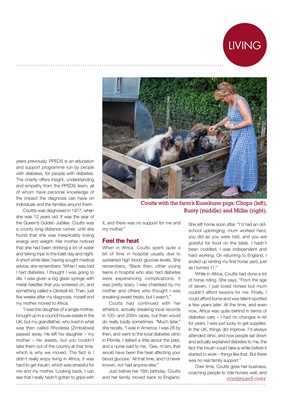
KITLIVING
years previously. PPEDS is an education
and support programme run by people
with diabetes, for people with diabetes.
The charity offers insight, understanding
and empathy from the PPEDS team, all
of whom have personal knowledge of
the impact the diagnosis can have on
individuals and the families around them.
Couttts was diagnosed in 1977, when
she was 12 years old. It was the year of
the Queen's Golden Jubilee. Coutts was
a county long-distance runner, until she
found that she was inexplicably losing
energy. Then, on the day of the Jubilee
day itself, it dawned on her that she'd
been drinking a lot of water and taking
trips to the toilet all the time. A short
while later, having sought medical advice,
she remembers: "When I was told I
had diabetes, I thought I was going to
die. I was given a big glass syringe with
metal needles that you screwed on, and
something called a Clinitest kit. Then, just
five weeks after my diagnosis, myself and
my mother moved to Africa.
"I was the daughter of a single
mother, brought up in a council house
estate in the UK, but my grandfather, who
lived in what was then called Rhodesia
[Zimbabwe] passed away. He left his
daughter - my mother - his assets, but
you couldn't take them out of the country
at that time, which is why we moved. The
fact is I didn't really enjoy living in Africa,
it was hard to get supplies, which was
stressful. Looking back, I can see that I
really hadn't gotten to grips with it, and no
one else really understood what it was like
living with the condition."
Feel the heat
When in Africa, Coutts spent quite a
bit of time in hospital usually due to
sustained high blood glucose levels. She
remembers, "Back then, other young
teens in hospital who also had diabetes
had already lost some toes; it was pretty
scary. I was chastised by my mother and
others who thought I was sneaking sweet
treats, but I wasn't."
Coutts had continued with her
athletics, actually breaking local records
in 100- and 200m races, but then would
do really badly sometimes. "Much later,"
she recalls, "I was in America, I was 28 by
then, and went to the local diabetes clinic
in Florida. I talked a little about the past,
and a nurse said to me, 'Gee, m'am, that
would have been the heat affecting your
blood glucose.' All that time, and I'd never
known, no one else had either, it would
xxxxxxxxxx Kerie Coutts.
seem."
Just before her 16th birthday, Coutts
and her mother moved back to England.
She left home soon after, "I'd had an oldschool upbringing;
mum worked hard,
you did as you were told, and you are
grateful for food on the table. I hadn't
been coddled, I was independent and
hard working. On returning to England, I
ended up getting my first horse yard, just
as I turned 17."
While in Africa, Coutts had done a lot
of horse riding. She says, "From the age
of seven, I just loved horses but initially
couldn't afford lessons. Finally, I could
afford some and was talent-spotted a
few years later. At the time, and even
now, Africa was quite behind in terms of
diabetes care - I had no changes in kit
for years. I was just lucky to get supplies.
In the UK, things did improve. I'd always
attended clinic, and now people sat down
and actually explained diabetes to me, the
fact the insulin could take a while before it
continued over